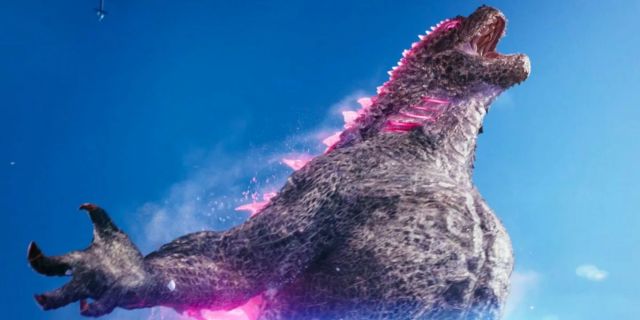Godzilla is not known for his loyalty. He’s a living being with allies and enemies, but he seems to lack consistency. There’s a reasonable argument to be made that Godzilla works in mysterious ways. His whims are often ineffable, only partially explained by traits common to animals. Sometimes Godzilla steps out of the sea to save humanity from an existential threat. Other times, he makes landfall to destroy everything in sight. Though the Monsterverse makes him a hero, Godzilla does his best work when he’s on the wrong side.
The Monsterverse has proven itself to be the most profitable version of the kaiju genre. Godzilla x Kong: The New Empire quickly became the second-highest-grossing film of 2024. It’s since slid down the rankings, but it will likely stay in the top ten by the year’s end. The latest installment’s massive success practically guarantees several future entries. While assuring the world that there will be a sequel, that financial windfall might trap the franchise in familiar tropes.
How does the Monsterverse portray Godzilla?
Titanus Gojira is a complicated figure in the Monsterverse. He first entered the world in 2014’s Godzilla reboot. This Godzilla is considerably larger than the usual take on the character. His personality is intensely animalistic. Godzilla rises from the sea to destroy several human structures, but it quickly becomes clear that his primary grievance is against other giant monsters. This pattern remains consistent. The Monsterverse’s Godzilla couldn’t care less about the fate of humanity in most cases. He destroys cities because they happen to be in his way. He kills other Titans for food, sport, and profit. Godzilla’s primary motivation is territorial. He considers himself the King of the Monsters, and he will not tolerate challengers to his throne. This leads to consistent, violent clashes with any monsters that dare to approach his world.
Godzilla is only barely a hero in the Monsterverse. Kong is generally a more heroic figure. Their shared entries usually treat Kong as the protagonist. If Godzilla is on his own, he’s the hero, but he looks like a villain next to Kong. That unorthodox trait keeps Godzilla broadly on the right side of the narrative. In both of his crossover projects, he starts a fight with the giant ape before fighting alongside him to fight a greater threat. Godzilla x Kong sees him traveling the world’s oceans to grow strong enough to put Kong down for good, only to immediately join his would-be enemy in the fight against the Skar King. Godzilla is a hero of circumstance, but he always seems to come down on the right side of the issue. He wrecks whatever he passes and sleeps in the Colosseum, but the world needs him to save the day from the other Titans.
Godzilla’s best films often cast him as the villain

Last year’s Godzilla Minus One was one of the finest films ever to star the King of the Monsters. It was so good, it put a thumb on the scale against Godzilla x Kong, massively weakening the latest Monsterverse entry’s critical appeal. Godzilla is unmistakably the antagonist of the piece, though his thematic brutality is secondary to the inhumanity the film stands against. He’s more of a walking natural disaster, representing both the usual atomic bomb and the broader American war machine. Before Minus One, Godzilla played the villain in Shin Godzilla. There again, he wasn’t the only antagonist. His campaign of violence provided a cataclysm for the bureaucracy to mishandle. This critical element of the story dates back to the original 1954 classic. Everyone knows that Godzilla is a metaphor for the atomic bomb, but his thematic potential is far less potent in his heroic appearances. In fact, heroism takes on unfortunate implications in the context of Godzilla’s history.
The philosophical implications of Godzilla as a hero

So, Godzilla is a necessary evil. He destroys a ton of property and kills countless innocent people, but his cataclysmic potential is the only way to stop other titanic threats. Humanity must be willing to accept the negative fallout of the strongest weapon on Earth, because the alternative is extinction. That’s the kind of argument that led to the creation of the atomic bomb. There has always been a moral unease about using Godzilla as a hero. He is, and will always be, a living representation of the weapon that killed hundreds of thousands of Japanese civilians. The implicit narrative is that, while nuclear weapons will cause casualties, they must be seen as a viable last-ditch effort. That inherently casts monsters like King Ghidorah and the Skar King as rival nations. Godzilla’s motivation is maintaining his iron-fisted grip on power. Anyone who challenges his reign must be put down. However, it is, inadvertently, an open call to engage in imperialist violence. One of the Monsterverse films even sees Serizawa, an open reference to the doctor from the 1954 original film, use a nuke to resurrect Godzilla. It’s explicit in its conjecture. No matter how evil Godzilla can be, at least his villainous portrayals are morally consistent.
There are two ways to enjoy Godzilla movies. The Monsterverse offers charming, humorous, and uncomplicated spectacles. They encourage the audience to turn off their brains and applaud every massive exchange of blows. On the other hand, films like Godzilla Minus One capture the poignance, creativity, and thematic brilliance of Godzilla as a cultural icon. While there’s absolutely room for both in the franchise, few would disagree with the latter as the more fulfilling experience. The common theme is Godzilla as a villain, and the creators should take that into account.











Leave a Reply